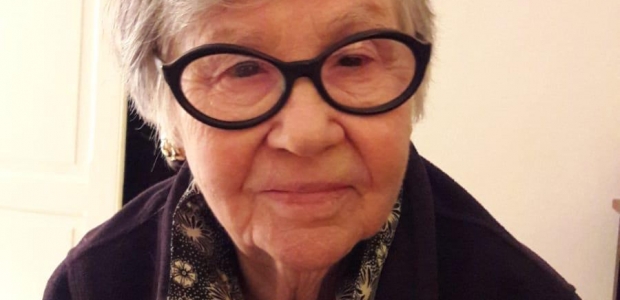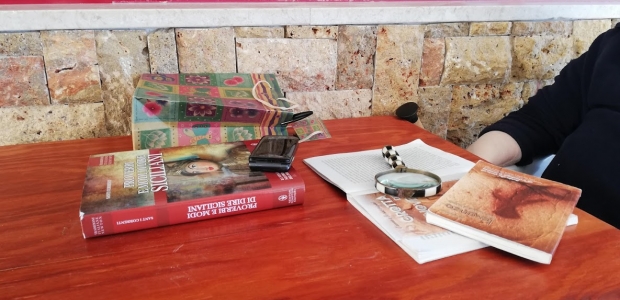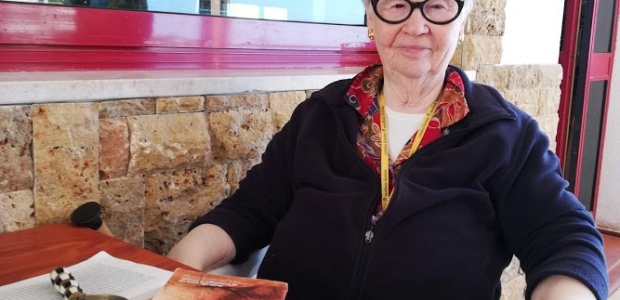Languages
Aunt Sarina, always speaking softly
In some places the monuments are not made by marble, or wood, or metal, but by flesh and bones, smiles and bright eyes that look at you for the first time as if they've always known you.
This is how Rosaria Campo, known by all as Zia Sarina, welcomes us under the veranda of the Arcobaleno bar, which overlooks the landing of hydrofoils at Levanzo. She looks us straight in the eye, as if she were waiting for us, and we really can not help but smile, and say hello, and ask where we have already seen this little woman with short hair and big glasses.
Actually it is difficult for anyone who has never set foot in Levanzo to have met her. Sarina has lived here for the past 91 years, the first of seven children. The mother was from Marettimo, father from Levanzo, and she grew up on the island with her parents, her brothers and her grandmother.
"I saw the planes passing over us, the bombs falling, but I did not know who was bombarding us, and why."
They all slept in the same bed, being careful not to fall, "recalls Sarina, and in the meantime we have already sat down at his table, cluttered with books, not remembering that she asked us to do it. We read the titles of those volumes, which tell the story of the territory of Levanzo, but also of the Egadi and of Sicily as a whole. Sarina tells us that she always liked reading, even as a young girl, and she also liked going to school. She did elementary school a little here, a little in Favignana, and she would have liked to do the averages too, in Trapani, but the war started, even if nobody had noticed it on the first.
"I saw the planes passing over us, the bombs falling, but I did not know who was bombarding us, and why."
We ask her what else she liked to do when she was young, in addition to reading, and she tells us that she was shy, very shy, and did not often like to go with other girls her age. She liked to lock herself in her room, and open the closet where an old gramophone was kept. She started it, she waited for the music to fill the room, and then she started to sing, still in a low voice.
Aunt Sarina keeps talking, she talks little about the war, she was 12 and she tried not to think about it. She speaks of Levanzo, of the plateau cloaked in fields and crops, of animals perched on the steep ground, of the boats that came and went from Cala Dogana, not only those of the fishermen, but also of the traders.
"And then what happened?" we have to ask, and Aunt Sarina, suddenly, starts to tell us a new story, about a young soldier on the island, when she was 17 years old. She saw him, occasionally, wandering around a bit, but she was shy, never paused too much to look at the young men. One day, while she was visiting her grandparents and aunt, she met him. She was alone, and he went ahead and asked, "Miss, what can I hope?"
She had answered him, in a tone that did not allow replies: "Hoping you die."
She liked to lock herself in her room, and open the closet where an old gramophone was kept. She started it, she waited for the music to fill the room, and then she started to sing, still in a low voice.
Because she loved only her father and her brothers, she did not want other men in her life.
After the war he left, he returned to Puglia. But after a short time, here he reappeared on the island, more determined than ever to get at least one hope from Sarina.
Sarina's father did not want to let her leave, let alone marry her so young, but the soldier was really stubborn. While remaining to court his beauty, he settled in Levanzo, working as a barber for a few lire. Mortifying himself to stay close to her.
Eventually Sarina could only give in to such insistence and devotion, and married him.
Her husband did much to do as a merchant between Levanzo and Marettimo, to keep the family, to ensure all their children an education. Was it a happy marriage? Here Sarina is saddened a bit ', her eyes wander far, chasing images that only she can see.
She talks to us about a little dead girl of pneumonia, her children sent to boarding school, the solitude of endless days, endless nights.
Yet at 91, she is still here, and she still wants to smile. After 45 years of marriage she remained a widow, but everyone in Levanzo calls her 'aunt' and she calls all 'my son', 'my daughter'. When we ask if we can embrace her, we feel that in her big heart she has already reserved a place for us too, and this awareness makes us feel a little happier, a little sadder, because we have to greet this little big woman, this monument living of Levanzo, who looks at us as if he has always known us, and speaks to us softly, always in a low voice.














